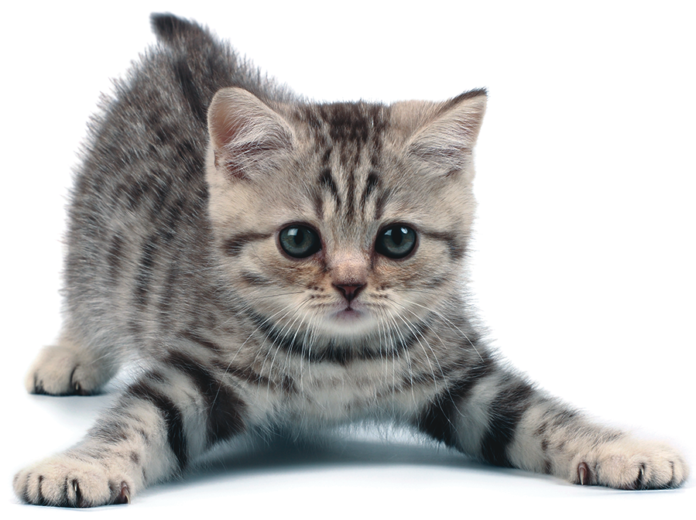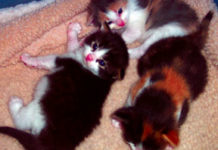Until recently, the treatment of feline infectious peritonitis (FIP) focused on providing supportive care and alleviating symptoms (see sidebar). For a cat with fluid buildup in the chest and/or abdomen, for example, removal of that fluid can ease breathing and make an affected cat more comfortable. While drugs such as prednisolone, a corticosteroid that is often used to treat chronic inflammatory diseases, have anecdotally been reported to help some cats with FIP survive for weeks or even months, the prognosis is generally poor for cats diagnosed with this condition.
Immunostimulants and immunomodulators have also been tried in cats with FIP, with little success. Some studies show that polyprenyl immunostimulant, a compound approved for use in cats with herpesvirus infections, may benefit some cats with the dry form of FIP, but these studies generally involved small numbers of cats and did not include a placebo group, which calls the interpretation of their results into question (the authors clearly acknowledged these limitations).
Research is now targeting anti-viral medications. “These are small molecules that are readily absorbed into cells and specifically target viral proteins that are essential for virus replication. Their toxicity for non-viral processes (i.e., cellular functions) is extremely low, making them both safe and efficacious,” says Dr. Niels Pedersen, FIP researcher and professor emeritus at the University of California-Davis School of Veterinary Medicine (UC Davis).
Symptoms of FIP
Fever that is not responsive to antibiotics
- Lethargy
- Poor appetite
- Accumulation of fluid in body cavities
- Neurological signs
What Is Feline Infectious Peritonitis (FIP)?
Most cases affect cats under 18 months old
Two drugs show promise for treating cats with FIP. One is known as GC376, which is in the process of obtaining FDA approval for treating cats with FIP. A second compound, the nucleoside analog GS-441524, is also being studied at UC Davis. This ompound inhibits RNA replication. Since these two medications work through different pathways, having the two options could mean more success for cats with FIP.
In a study at UC Davis, 18 of 26 cats responded favorably to the first 12-week course of treatment with GS-441524. Some cats relapsed and required a second course, but at this time, 24 of these cats are doing well.
The clinical response of the 26 cats that completed at least 12 weeks of treatment was dramatic. Fever usually resolved within 12 to 36 hours, concurrent with a marked daily improvement in appetite, activity levels, and weight gain. Abdominal effusions rapidly disappeared over a one- to two-week period starting around 10 to 14 days post-treatment. Cats with thoracic effusions were usually dyspneic (struggling to breathe) upon presentation to private veterinarians, prompting removal of pleural effusions prior to coming to UC Davis. Residual dyspnea and thoracic effusion responded rapidly to treatment and were no longer apparent after seven days.
With the advent of these two drugs, veterinarians began to celebrate the notion of an upcoming cure for FIP, but the COVID-19 pandemic has slowed testing and funding. UC Davis reports that it may be two to five years before these drugs are routinely available to veterinarians.
Research investigating the development of a vaccine to prevent the coronavirus mutation that results in FIP and of an accurate diagnostic test is ongoing at Colorado State University, but neither of these options is available yet.
Cats with naturally occurring FIP require at least 12 weeks of GS-441524 therapy, but this drug is currently not FDA-approved, is quite expensive, and should not necessarily be considered a cure for FIP at this stage. There are black-market sources offering these medications to pet owners, but the quality and exact composition of these products can vary widely. Unfortunately, your veterinarian cannot legally prescribe these medications at this time.
For now, owners of cats with FIP should discuss treatment options for their cats with their veterinarians. UC Davis and the Cornell Feline Health Center maintain excellent resources on FIP that can help owners stay on top of developments related to this disease, and we at CatWatch will keep you informed.
Can I Prevent FeCV?
Preventing FeCV infection is challenging given its ubiquitous nature, especially in cats that are housed in high density (shelters, catteries). FeCV is contagious (through feces and saliva of infected cats) and infects other cats primarily via the oral cavity. Newly acquired cats and any cats suspected of being infected with FeCV may be separated from other cats, although the usefulness of this management strategy is debatable.
A Hot Connection?
Obviously, the treatment of coronaviruses is a hot topic these days. According to a story in The Atlantic, “An interesting thing about GS-441524 is that it is almost identical to a much buzzed-about human drug: remdesivir, the antiviral currently our best hope for treating COVID-19, the disease caused by the novel coronavirus. Although early data suggest that the drug shortens recovery time at best, Dr. Anthony Fauci has touted remdesivir from the White House. The Food and Drug Administration has authorized it for emergency use. And Gilead Sciences, the company that makes remdesivir, is donating 1.5 million doses of the drug amidst the pandemic.” Sadly, for cats, the focus on the potential of remdesivir aiding in human COVID-19 treatment has led to a significant decrease in the number of studies investigating the use of GS-441524 to treat FIP.




